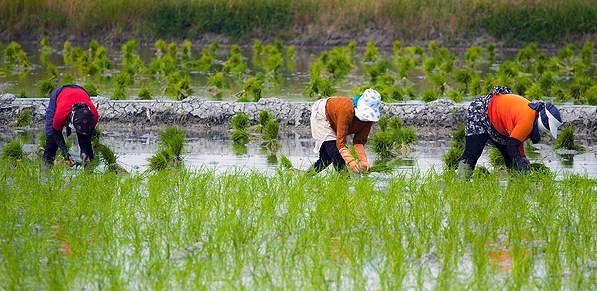
[caption id="attachment_7996" align="aligncenter" width="698"] File Photo[/caption]
Iran's Ministry of Agriculture has been proud of cultivating highly water-dependent crops. But cultivating rice on land other than the Caspian Sea border is like shooting at the feet.
The cultivation of rice, which started more than 20 years ago, has dried up rivers and led to the depletion of underground waters in some places. To compensate for water shortage, farmers are digging deeper and deeper wells to irrigate paddy fields.
The massive consumption of surface waters to irrigate paddy fields or other water-intensive crops like onion or watermelon has even disrupted the ecosystem in certain areas.
However, officials, especially those in the ministries of agriculture and energy, are either ignorant of the short-term and long-term consequences of this move or they are purely careless.
It is also possible that agriculture ministers want to take pride that during their management of the ministry the production of rice increased in the country.
Iran is an arid and semi-arid country, and during history Iranians had learned how to manage water resources. But now that Iran is seeing less precipitation and more droughts due to climate change farmers are being allowed to grow crops that need lots of water.
The official IRNA news agency Published a series of photos on September 12, 2020, showing that farmers cultivate rice in the Qasr-e Qand region of Sistan-Baluchestan, which is famous as a desert province. IRNA said rice is cultivated twice a year in the region.
Even rice cultivation in northern provinces of Iran must be regulated. Mohsen Fallah Niazi, a native of Mazandaran province, says some farmers cultivate rice two times a year in Mazandaran despite the fact that underground waters are going down more each year.
The price of rice in comparison to other crops in the market is so enticing that it is very difficult to convince farmers to turn to other alternative crops. It is so profitable that some farmers dig wells without receiving a permit from the Ministry of Energy.
However, it seems that officials have no plans to ban the cultivation of rice and other water-intensive crops. Probably, it is customary that officials don’t try to resolve an evolving problem before it turns into a crisis like what has happened in Khuzestan province. Find more.
Source: Online/KSU
File Photo[/caption]
Iran's Ministry of Agriculture has been proud of cultivating highly water-dependent crops. But cultivating rice on land other than the Caspian Sea border is like shooting at the feet.
The cultivation of rice, which started more than 20 years ago, has dried up rivers and led to the depletion of underground waters in some places. To compensate for water shortage, farmers are digging deeper and deeper wells to irrigate paddy fields.
The massive consumption of surface waters to irrigate paddy fields or other water-intensive crops like onion or watermelon has even disrupted the ecosystem in certain areas.
However, officials, especially those in the ministries of agriculture and energy, are either ignorant of the short-term and long-term consequences of this move or they are purely careless.
It is also possible that agriculture ministers want to take pride that during their management of the ministry the production of rice increased in the country.
Iran is an arid and semi-arid country, and during history Iranians had learned how to manage water resources. But now that Iran is seeing less precipitation and more droughts due to climate change farmers are being allowed to grow crops that need lots of water.
The official IRNA news agency Published a series of photos on September 12, 2020, showing that farmers cultivate rice in the Qasr-e Qand region of Sistan-Baluchestan, which is famous as a desert province. IRNA said rice is cultivated twice a year in the region.
Even rice cultivation in northern provinces of Iran must be regulated. Mohsen Fallah Niazi, a native of Mazandaran province, says some farmers cultivate rice two times a year in Mazandaran despite the fact that underground waters are going down more each year.
The price of rice in comparison to other crops in the market is so enticing that it is very difficult to convince farmers to turn to other alternative crops. It is so profitable that some farmers dig wells without receiving a permit from the Ministry of Energy.
However, it seems that officials have no plans to ban the cultivation of rice and other water-intensive crops. Probably, it is customary that officials don’t try to resolve an evolving problem before it turns into a crisis like what has happened in Khuzestan province. Find more.
Source: Online/KSU
Comment Now